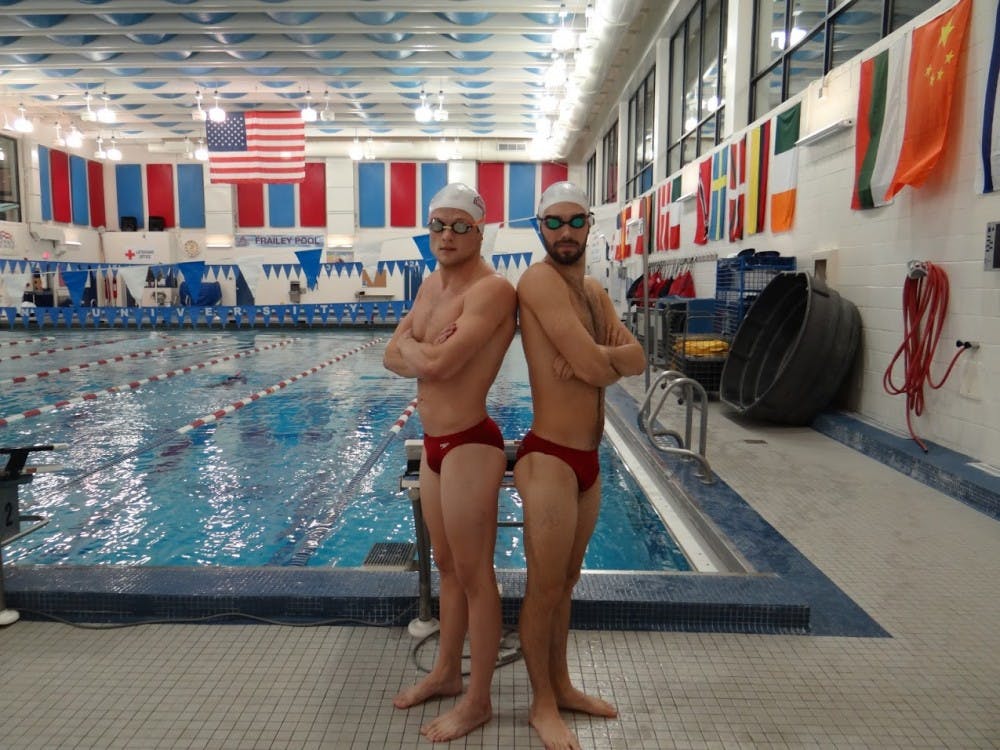LGBTQ+ athletes, past and present, have had to hide their sexualities due to the stigma they may face both inside and outside of the locker room. Being a non-heterosexual athlete comes with several obstacles, including harassment and discrimination from teams and fans, being labeled as distractions and feeling like a distinct minority among teammates.
Gender roles and societal norms play into the challenges faced by LGBTQ+ athletes, said Blaine Johnson, a junior on AU’s swimming and diving team and a member of the LGBTQ+ community.
“Society, at times, paints this picture that to be an athlete or a jock as a male, you need to carry and present yourself in certain ways,” Johnson said. “A lot of times, society thinks that to be ‘macho,’ if you will, one needs to be very straight-acting. The way society tries to dictate how each gender should act carries over to how coaches, teammates, and fans act.”
Research shows that those societal pressures take their toll on student-athletes. A 2012 study by the advocacy group Campus Pride found that LGBTQ+ student-athletes “generally experienced a more negative climate than their heterosexual peers, which adversely influenced their athletic identities and reports of academic success.”
That’s part of the reason why Johnson and his teammate, senior Sam Fromkin, are working to bring Athlete Ally, an organization dedicated to creating LGBTQ+ inclusive athletic environments, to AU. One of Johnson’s main goals is to come together with prominent members of AU’s athletic department to create policies for students who are “sexual minorities or gender minorities.”
“There’s a lack of evident LGBTQ+ policy in our athletic department, and while they have been extremely welcoming, I think they could take it one step farther and create policies so that LGBTQ+ athletes know that they are welcome at American,” Johnson said. “Having those policies upfront and without people having to look too hard for them would just create a better atmosphere.”
While acts of discrimination toward AU’s LGBTQ+ student-athletes may not be apparent at the surface level, they do exist, Fromkin said.
“I know firsthand,” Fromkin said. “Oppression against the LGBTQ+ community will exist, so our goal is to foster positivity and support in all aspects, whether it's in the pool, in the classroom, or at home with teammates.”
Fromkin would like Athlete Ally to address issues such as dating advice and how to make friends, which can be more challenging for LGBTQ+ members due to the discrimination they face.
“Being a student-athlete is tough, so we want to be able to connect with people who are also athletes and part of the LGBTQ+ community or an ally to find a sense of community in the athletic department,” Fromkin said.
While the Center for Diversity and Inclusion offers good resources for LGBTQ+ students, Johnson said, issues within the athletic department are referred to the CDI office instead of being handled internally.
Athena Argyropoulos, AU’s senior associate athletic director and senior woman administrator, said AU’s athletic department is “very inclusive.” Argyropoulos, who has worked for the AU athletics administration team for over 11 years, is responsible for checking on student-athletes’ personal welfare, which includes looking after athletes’ day-to-day lives and ensuring that players and coaches receive equitable treatment, she said.
“We work in conjunction with AU’s LGBTQ+ and minority services,” Argyropoulos said. “I make sure that all of our athletes feel comfortable and know that we have an open door policy here.”
In the past, Argyropoulos said she has worked together with student-athletes and LGBTQ+ resources on campus in order to improve allyship and inclusion within AU athletics. She added that Johnson and Fromkin had approached her about forming a group for LGBTQ+ athletes and allies.
Argyropoulos said she believes that reform surrounding LGBTQ+ athletes and their comfort embracing their identity needs to stem from coaching staffs and the NCAA as a whole. The NCAA holds Title IX training sessions with college athletic departments, mainly focused on sexual violence policy, and the University is compliant with NCAA, Patriot League and university rules, she said.
Getting more involved directly with recruits would help LGBTQ+ students acclimate better to campus life, Fromkin said. He said there is “definitely” room for improvement that can come from within to better support these athletes, including a possible new position in the athletic department that would address diversity issues.
“I feel that the presence of Athlete Ally on our campus will definitely attract more LGBTQ+ student athletes to commit to AU, especially if they are still trying to find their identity,” Fromkin said. “Even having a person who can talk to recruits and directly get involved with LGBTQ+ and diversity in general would make such a difference.”
Though LGBTQ+ athletes at AU have begun to organize, there is not widespread representation of LGBTQ+ athletes in college athletics or major sports leagues. Minnesota United midfielder and D.C.-native Collin Martin publicly came out as gay in June, becoming Major League Soccer’s only gay player active in the league and second openly gay player in its history.
Johnson said that Martin’s message is a positive one and shows that there has been progress in professional sports, though there’s still more work to be done.
“It shows that we are slowly moving in the right direction and that athletics as a whole is starting to become more inclusive,” Johnson said. “I think that it shows to athletes at all different levels and of different ages that it's OK to be gay or be different in sports. You're still an athlete and you can still compete at a very high level, obviously in Martin’s case, at the professional level.”
This article originally appeared in The Eagle's October 2018 fall print edition.





